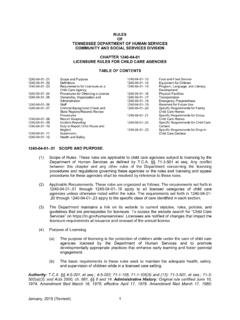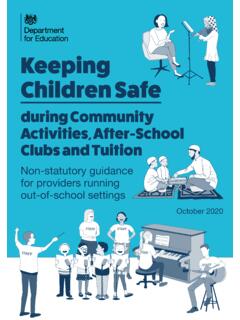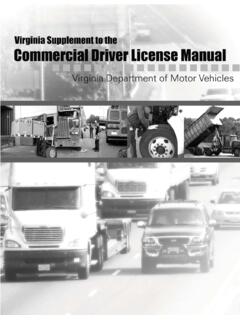Transcription of Statutory Taxi & Private Hire Vehicle Standards - GOV.UK
1 Statutory Taxi & Private Hire Vehicle Standards July 2020 2 Contents Page 1. Introduction .. 4 2. Consideration of the Statutory Taxi and Private Hire Vehicle Standards .. 6 3. Administering the Licensing Regime .. 8 Licensing polices .. 8 Duration of licences .. 9 Whistleblowing .. 9 Consultation at the local level .. 10 Changing licensing policy and requirements .. 10 4. Gathering and Sharing Information .. 12 The Disclosure and Barring Service .. 12 The Disclosure and Barring Service Update Service .. 13 Common Law Police Disclosure .. 13 Licensee self-reporting.
2 13 Referrals to the Disclosure and Barring Service and the Police .. 14 Working with the Police .. 15 Sharing licensing information with other licensing authorities .. 15 Multi-agency Safeguarding Hub (MASH) .. 16 Complaints against licensees .. 17 Overseas convictions .. 17 5. Decision Making .. 19 Administration of the licensing framework .. 19 Training decision makers .. 19 The regulatory structure .. 20 Fit and proper test .. 21 Criminal convictions and rehabilitation .. 21 6. Driver Licensing .. 23 Criminality checks for drivers .. 23 Safeguarding awareness .. 23 County lines exploitation.
3 24 Language proficiency .. 25 3 7. Vehicle Licensing .. 26 Criminality checks for Vehicle proprietors .. 26 In- Vehicle visual and audio recording CCTV .. 27 Stretched Limousines .. 28 8. Private Hire Vehicle Operator Licensing .. 29 Criminality checks for Private hire Vehicle operators .. 29 Booking and dispatch 30 Record keeping .. 31 Use of passenger carrying vehicles (PCV) licensed drivers .. 31 9. Enforcing the Licensing Regime .. 33 Joint authorisation of enforcement officers .. 33 Setting expectations and monitoring .. 33 Suspension and revocation of driver 33 Annex Assessment of Previous Convictions.
4 35 Annex Disclosure and Barring Service information .. 37 Annex CCTV Guidance .. 38 Annex - Staying Safe: Guidance for Passengers .. 40 4 1. I ntroduction There is evidence to support the view that taxis and Private hire vehicles are a high-risk environment. In terms of risks to passengers, this can be seen in abuse and exploitation of children and vulnerable adults facilitated and in some cases perpetrated by the trade and the number of sexual crimes reported which involve taxi and Private hire Vehicle drivers. Links between the trade and child sexual abuse and exploitation have been established in many areas and other investigations continue.
5 Data on reported sexual assaults by taxi and Private hire Vehicle drivers evidence the risk to passengers; data from Greater Manchester and Merseyside suggest that, if similar offence patterns are applied across England, 623 sexual assaults per year are reported. These figures do not however account for the under reporting of crime which is estimated to be as high as 83 percent in the Crime Survey for England and Wales. The Policing and Crime Act 2017 enables the Secretary of State for Transport to issue Statutory guidance on exercising taxi and Private hire Vehicle licensing functions to protect children and vulnerable individuals who are over 18 from harm when using these services.
6 For the purposes of this document, a child is defined as anyone who has not yet reached their 18th birthday; and the term vulnerable individual has the same meaning as the definition of a vulnerable adult for the purpose of section 42 of the Care Act 2014, which applies where a local authority has reasonable cause to suspect that an adult in its area (whether or not ordinarily resident there): (a) has needs for care and support (whether or not the authority is meeting any of those needs), (b) is experiencing, or is at risk of, abuse or neglect, and (c) as a result of those needs is unable to protect himself or herself against the abuse or neglect or the risk of it.
7 Whilst the focus of the Statutory Taxi and Private Hire Vehicle Standards is on protecting children and vulnerable adults, all passengers will benefit from the recommendations contained in it. There is consensus that common core minimum Standards are required to regulate better the taxi and Private hire Vehicle sector, and the recommendations in this document are the result of detailed discussion with the trade, regulators and safety campaign groups. The Department therefore expects these recommendations to be implemented unless there is a compelling local reason not to.
8 It should be noted that as policing and criminal justice is not a devolved matter, the Statutory Taxi and Private Hire Vehicle Standards issued under the Policing and Crime Act 2017 will continue to have effect in Wales although responsibility for taxi and Private hire Vehicle policy was devolved to the Welsh Assembly in April 2018. Should the Welsh Government introduce legislation to regulate on these issues, the Standards in this document would, cease to apply. 5 All local authorities and district councils that provide children s and other types of services, including licensing authorities, have a Statutory duty to make arrangements to ensure that their functions and any services that they contract out to others are discharged having regard to the need to safeguard and promote the welfare of children.
9 This means that licensing authorities should have in place arrangements that reflect the importance of safeguarding and promoting the welfare of children. This includes clear whistleblowing procedures, safe recruitment practices and clear policies for dealing with allegations against people who work with children, as set out in the Working Together to Safeguard Children Statutory guidance. The Statutory Taxi and Private Hire Vehicle Standards reflect the significant changes in the industry and lessons learned from experiences in local areas since the 2010 version of the Department s Best Practice Guidance.
10 This includes extensive advice on checking the suitability of individuals and operators to be licensed; safeguarding children and vulnerable adults; the Immigration Act 2016 and Common Law Police Disclosure (which replaced the Notifiable Occupations Scheme). The Standards in this document replace relevant sections of the Best Practice Guidance issued by the Department in 2010, where there is a conflict between the Statutory Taxi and Private Hire Vehicle Standards and the Best Practice Guidance the Department issue on taxi and Private hire Vehicle licensing, the Standards in this document take precedence.














